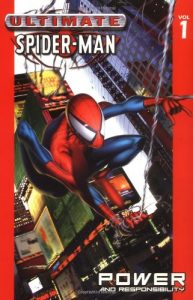 A thing that is rapidly striking me as odd about the Ultimate Marvel universe is how unrelated the stories are, compared to 1960s Marvel. I mean, I’ve read three origin stories now, and all of them refer to events that are mutually exclusive of each other. As though they’re all actually set in mildly disparate realities from one another. This is not something that troubles me particularly, just an oddity. I mention it in part because it struck me last time and I never said, but also because it’s one of the many aspects informing my reading of the first Ultimate Spider-Man.
A thing that is rapidly striking me as odd about the Ultimate Marvel universe is how unrelated the stories are, compared to 1960s Marvel. I mean, I’ve read three origin stories now, and all of them refer to events that are mutually exclusive of each other. As though they’re all actually set in mildly disparate realities from one another. This is not something that troubles me particularly, just an oddity. I mention it in part because it struck me last time and I never said, but also because it’s one of the many aspects informing my reading of the first Ultimate Spider-Man.
Other aspects include the initial Spider-Man movie, which appears to have been heavily influenced by this volume, my readings of the first 31 issues of the Amazing Spider-Man comic[1], and my expectations relative to the other Ultimate series in which I’ve dabbled that this one would be the most kid-oriented. And indeed, our Peter Parker is a mere 15 years old, with a fair bit of modern angst to him. So, on the whole, it really feels like I should be feeling a little meh about the whole thing. Instead, I enjoyed myself a lot. My guesses about this are that I’m even more of a sucker for high school angst than I thought (and, come on, get over it already, man), or that lowered expectations were just right for the book, or that the original story Stan Lee put together in 1963 has such a heaping helping of mythic resonance that any given retelling will affect me just as much as the first time I saw it. I think there’s a pretty good chance it’s that last one.
[1] I’ll be reading #32 pretty immediately after this review posts, in point of fact. Mary Jane Watson has been the elephant in the corner for at least 25 issues now, which is kind of hilarious to me, given my knowledge of what the future holds. I have to believe that Stan Lee had her in mind as the real deal all along; the set-up is too perfect to be coincidence.
1. The Ultimate things started off with a “no continuity” mandate, so didn’t really interact at all. Later, they do, and they are clearly part of the same universe despite how different they feel.
2. The movie influenced the book, I think, is how the chronology worked. They realized that the movie would bring in this whole audience of people who had ZERO CHANCE of understanding Spider-Man, and who wouldn’t relate the high school kid they’d just seen on the screen to the middle-aged married dude in the books, so they launched the Ultimate stuff.
3. Also, don’t rule out Bendis’ writing. He’s good at snappy banter and characterization.
1. That definitely explains that. It’s like, yeah, clearly the same timeline and universe, but every single one of them seems to think that the others were there first. It’s disturbing in a very subtle way.
2. I guess the movie could well have come out earlier than I’m imagining. They were quite close to each other, in any event, and definitely drawn from the same essential source.
3. You will not find me disagreeing on this point. I hope to remain pleasantly surprised by the next several. Although the cost of all these graphic novels is disturbingly high, if I think of them collectively instead of in my one at a time scheme thusfar. (Well, more than that at the used bookstore, but those are cheaper.)
They used to have hardcover editions that collected like two of the paperback volumes in a single hardcover for less than the cost of two paperbacks, but apparently they’re out of print now. Oh well!
Pingback: Shards of Delirium » Ultimate Spider-Man: Cats and Kings
Pingback: Spider-Man: Homecoming | Shards of Delirium